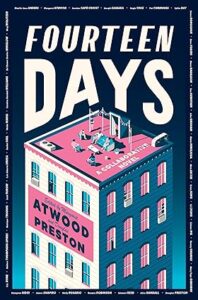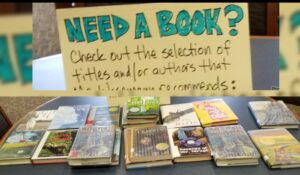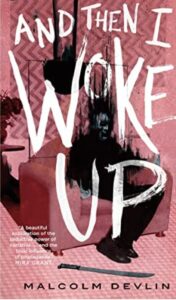Fourteen Days edited by Margaret Atwood and Douglas Preston
HarperCollins, 2024
ISBN-13 : 978-0358616382
Available: Hardcover, paperback, audiobook, Kindle edition
Buy: Bookshop.org | Amazon.com
Fourteen Days is a collaborative novel written by thirty-six American and Canadian authors, benefiting the Authors Guild Foundation. It takes place during the Covid-19 pandemic in a dilapidated apartment building during fourteen days under a shelter-in-place edict in New York City. Yessenia, the new super, is stuck in the building without the resources to do her job and unable to get through to the nursing home where her father is a resident. The previous super left his things behind, including a journal with notes about and a nickname for each tenant.
Unable to stand staying isolated inside, the residents start gathering on the rooftop each evening to tell stories, each night over the course of fourteen days. Yessenia never refers to them by name, only their nickname, and she secretly starts to record the stories on her phone and transcribe them into the super’s journal.
The structure of people isolating themselves to tell stories during a plague reminded me of The Decameron but the editors specifically say it is not… and one of the stories, told by a professor who attended a book group that read from it, acts as a critique that suggests that this is actually a counter narrative, including people from different ages, belief systems, backgrounds, and races: the people who, unlike the characters of The Decameron, don’t have the wealth to escape the city as the plague rages.
At first the book seems grounded in realism: maybe it’s not something likely to occur, but it seems possible, with events that did occur, like the inability to get through to nursing homes, and unlike many stories set during the pandemic, here it is integral to the story. But unexplained events start to occur. Is the building haunted? Did a spider girl really interrupt their gathering? What’s the noise in the apartment above the super’s?
The stories also get weirder, more confessional, and gruesome, such as the story of Elijah Vick, who lost his arm to an alligator gar, and a story of retribution against a rapist. Other readers may guess the ending sooner than I did, but it managed to surprise me.
Fourteen Days does not have many contributions from horror writers, but it does have many “literary” authors contribute strange, unsettling, and disturbing tales, including Dave Eggers, Tommy Orange, and Margaret Atwood. It is a haunted novel, and worth the time to untangle.
Reviewed by Kirsten Kowalewski







Follow Us!